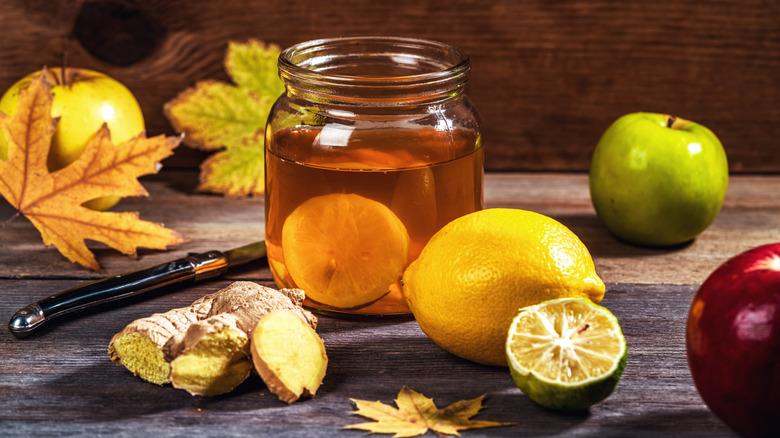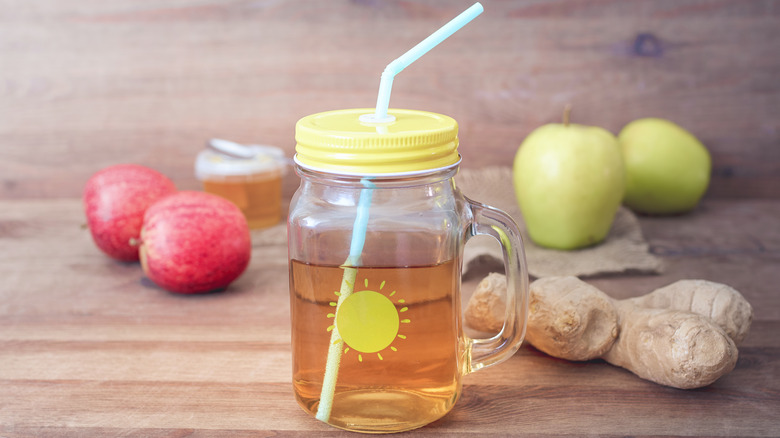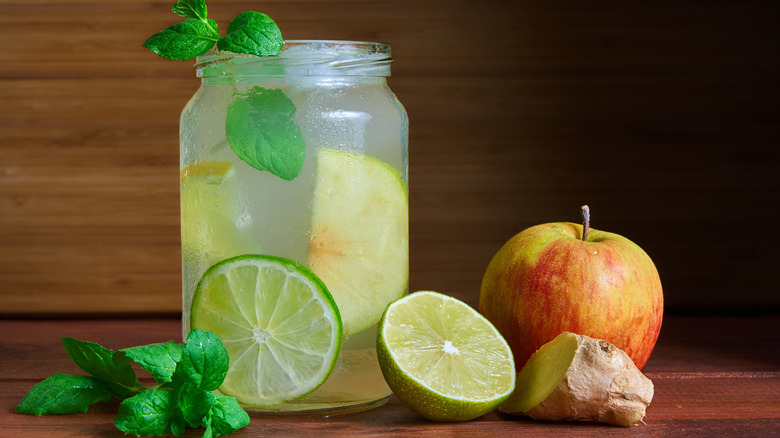The Unusual Reason Drinking Vinegar Became So Popular
Vinegar is versatile. The sour liquid can be made by fermenting either apples, barley, grapes, oats, rice, sugar, or wine — just to name a few options — per the Encyclopedia Britannica. As such, there are several types of it, including balsamic, cider, and malt, plus even more specific, specialty varieties with herbs added for flavor (via Harvard's School of Public Health). Whatever's used as the base ingredient, the liquid is twice-fermented by yeast, traditionally in a cask.
This practice dates far back. According to Harvard, it's believed vinegar was first discovered when leftover wine fermented further and therefore soured. This happy accident has been traced to Babylon, circa 5,000 B.C., where it was used as an ingredient, medicine, and preservative. Now, most people use vinegar to flavor dishes or change their textures, or perhaps even pickle something. It can also be used as a "green" cleaning product, like in the case of white distilled vinegar.
What about as a beverage? Folks don't drink vinegar too often these days. However, quenching thirst is as much of a tradition as vinegar's other uses. Harvard notes ancient peoples like the Greeks and those in the Middle East drank it to aid in digestion, promote physical well-being, and treat coughs. Did that Old World fad ever reach the New World?
Haymaker's punch
More recently, Americans consumed a vinegary concoction called switchel, also known as switzel or haymaker's punch. It's unclear how exactly it arrived in the United States, per Smithsonian Magazine. Some state this punch came from the West Indies, while others say the Amish brought it. According to the Farmers' Almanac, switchel might even have arrived stateside after taking on its modern(ish) form in China. Just like switzel's uncertain origins, the recipe involved is a little bit nebulous. Traditionally, it contains cider vinegar, ginger, and water, plus a variable sweetener like maple syrup, molasses, sugar (typically brown), and honey.
How did it become popular? Starting in the 1700s, throughout the 1800s, and into the early 1900s, fieldworkers drank haymaker's punch as a refreshment, as noted by Farmers' Almanac. Back then, it was thought hot drinks agreed well with the body when it was already warm from working in the sun. The ginger in this drink brought a "heat" that wasn't too hot temperature-wise. Switchel's sweeteners all happen to have electrolytes, too, making the beverage reinvigorating (via Smithsonian Magazine). As for vinegar, that brought a sweet, tangy taste its imbibers enjoyed. The Old Farmer's Almanac (a different almanac) documents that rum was often mixed into switzel, also, and that the punch was a favorite beverage of the U.S. Congress. Not only did the mix satiate those politicians, but the vinegar may have also repelled bothersome bugs. Now that's an all-in-one drink!
Modern switchel
Do people still drink switchel? The Amish certainly do, per Smithsonian Magazine. Plus, Farmers' Almanac reports haymaker's punch is actually making quite the comeback as of late. After all, those electrolytes sure are appealing to athletes. Compared to soda or a sports drink, switzel is relatively healthy: It's got minerals, natural sugars, potassium, and vitamins. Certain venues like farm-to-table festivals, honoring old-timey beverages, sometimes serve it, as well. A 2015 review by the Guardian notes the drink began to catch on with "hipsters" in the 2010s, sold alongside kombucha for a high price in places like Brooklyn. In 2017, the Washington Post reported that New York bartenders and chefs were bringing switzel to their menus, accentuated by new ingredients like blueberries, peppers, and vodka.
Switchel isn't the only drink that benefits from vinegar, though. Apple cider vinegar, for instance, has the ingredient right there in the name and comes with many of its own useful benefits. Bragg even sells a line of "ACV Refreshers" in flavors like Pomegranate Cherry and Lime Citrus. It may sound unusual, but drinking vinegar could become all the rage again, especially in the hot summers ahead.


